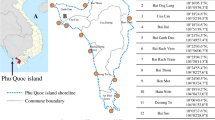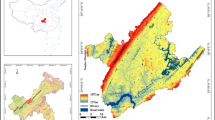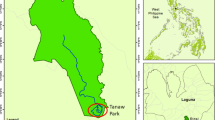Abstract
Water conservancy project leads to the reorganization of the economic and social structure of resettled communities. As an important extension of the water conservancy project, water conservancy project tourism brings livelihood compensation to the surrounding residents, thereby improving the adaptability of nearby-resettled people. Therefore, a study on the impact of water conservancy project tourism on the adaptability of nearby-resettled people will help to reasonably resettle and promote the development of water conservancy project tourism. This paper constructed four influence dimensions "Economy—Industrial development—Social harmony—Quality-of-life" of water conservancy project tourism. The Structural Equation Model (SEM) was introduced to explore the impact of water conservancy project tourism on the adaptability of nearby-resettled people, which took the Three Gorges Water Conservancy Project tourism area and the resettled gathering areas—San Douping Town and Tai Pingxi Town as the research objects. The results showed that: (1) The economic benefits generated in the process of water conservancy projects tourism development that affected the adaptability of nearby-resettled people by promoting industrial development, and the quality of life of resettled people was an important intermediary factor affecting adaptability; (2) In the path relationship of the water conservancy project tourism adaptability factors to nearby-resettled areas, industrial development had the largest impact on social harmony and the standardized path coefficient was significantly 0.95; (3) The economic benefits generated by water conservancy project tourism and industrial development change the adaptability of nearby-resettled areas through their perception of the quality of life. This study can provide some suggestions for the reconstruction of the relationship between the water conservancy project tourism communities and the improvement of the adaptability of nearby-resettled areas.


Similar content being viewed by others
References
Amati V, Meggiolaro S, Rivellini G, Zaccarin S (2018) Social relations and life satisfaction: the role of friends. Genus 74:7. https://doi.org/10.1186/s41118-018-0032-z
Barua P, Rahman S, Eslamian S (2021) Rehabilitation and relocation program for climate displaced People of Bangladesh, 65–89. https://doi.org/10.1007/978-3-030-22759-3_298-1
Boadi EB, Chen SJ, Amponsah EI, Appiah R (2022) Antecedents of residential satisfaction in resettlement housing in ellembelle: a PLS-SEM approach. Sustainability 14. https://doi.org/10.3390/su141811256
Bui TMH, Schreinemachers P, Berger T (2013) Hydropower development in Vietnam: involuntary resettlement and factors enabling rehabilitation. Land Use Policy 31:536–544. https://doi.org/10.1016/j.landusepol.2012.08.015
Bujang A, Suki N M, Suki N M, (2017a) Structural relationship between women consumers' attitude and actual behavior in mobile retailing. Advanced Science Letters 23(9):8160–8163. https://doi.org/10.1166/asl.2017.9853
Carrasco S, Ochiai C, Okazaki K (2016) Influence of housing designs on resident-initiated housing modifications in resettlement sites in Cagayan de Oro, Philippines. Journal of Social Safety Science 28:61–68. https://doi.org/10.11314/jisss.28.61
Chen X, Vanclay F, Yu J (2021) Evaluating Chinese policy on post-resettlement support for dam-induced displacement and resettlement. Impact Assessment Project Appraisal 39:396–404. https://doi.org/10.1080/14615517.2020.1771051
Clark A, Frijters P, Shields MA (2008) Relative income, happiness, and utility: an explanation for the easterlin paradox and other puzzles. J Econ Literature 46:95–144. https://doi.org/10.2139/ssrn.998225
Croes R, Ridderstaat J, van Niekerk M (2018) Connecting quality of life, tourism specialization, and economic growth in small island destinations: the case of Malta. Tour Manag 65:212–223. https://doi.org/10.1016/j.tourman.2017.10.010
Cui SY, Xu DD, Peng L, Liu SQ (2016) Analysis on the capital characteristics and differences between local resettlement and original residents in the Three Gorges Reservoir Area: a case study of Wanzhou District, Chongqing. J Southwest Normal Univ (natural Science Edition) 41:80–86. https://doi.org/10.13718/j.cnki.xsxb.2016.08.014
Deaton A (2008) Income, health, and well-being around the world: evidence from the Gallup World Poll. J Econ Perspect 22:53–72. https://doi.org/10.1257/jep.22.2.53
Dell’Anno R, Amendola A (2013) Social exclusion and economic growth: an empirical investigation in European economies. Rev Income Wealth. https://doi.org/10.1111/roiw.12096
Easterlin RA (1995) Will raising the incomes of all increase the happiness of all? J Econ Behav Organ 27:35–47. https://doi.org/10.1016/0167-2681(95)00003-B
Eslamian S, Gohari A R, Ostad-Ali-Askari K, Sadeghi N (2018) Reservoirs. In: Bobrowsky P, Marker B (eds) Encyclopedia of engineering geology. Springer, Cham, 1–5. https://doi.org/10.1007/978-3-319-12127-7_236-1
Eunju W, Hyelin K, Muzaffer U (2015) Life satisfaction and support for tourism development. Ann Tour Res 50:84–97. https://doi.org/10.1016/j.annals.2014.11.001
Federico IS (2015) Tourism: economic growth, employment and Dutch Disease. Ann Tour Res 54:172–189. https://doi.org/10.1016/j.annals.2015.07.007
Ghashghaie M, Eslami H, Ostad-Ali-Askari K (2022) Applications of time series analysis to investigate components of Madiyan-rood river water quality. Appl Water Sci 12:202. https://doi.org/10.1007/s13201-022-01693-5
Hällsten M, Edling C, Rydgren J (2017b) Social capital, friendship networks, and youth unemployment. Soc Sci Res 61:234–250. https://doi.org/10.1016/j.ssresearch.2016.06.017
Han GH, Wu YZ, Yan TZ, Chen XB (2001) Resettlement methods of reservoir area in China and its enlightenment. Popul Econ 02:44–47+70
He ZQ, Huang DC, Ma ZJ, Thomas R (2017) Social impact path of water conservancy project based on structural equation model. Water Conserv Econ 35(1): 26–30+76. https://doi.org/10.3880/j.issn.1003.9511.2017.01.007
Huang J, Tian Y, Song M F, Khanal R, An M (2022) Three gorges project resettles employment willingness and behavior mechanism: a grounded theory approach. Sage Open. https://doi.org/10.1177/21582440221125152
Jiménez Ambriz MG, Izal M, Montorio I (2012) Psychological and social factors that promote positive adaptation to stress and adversity in the adult life cycle. J Happiness Stud 13:833–848. https://doi.org/10.1007/s10902-011-9294-2
Kaser A (2016) Social satisfaction and sense of belonging: revisiting student persistence. Retrieved from the University of Minnesota Digital Conservancy. https://hdl.handle.net/11299/185084
Ko DW, Stewart WP (2002) A structural equation model of residents’ attitudes for tourism development. Tour Manage 23:521–530. https://doi.org/10.1016/S0261-5177(02)00006-7
Kober R, Eggleton IRC (2005) The effect of different types of employment on quality of life. J Intellect Disabil Res 49:756–760. https://doi.org/10.1111/j.1365-2788.2005.00746.x
Kong DP, Shi CL (2020) Feeling and cognition: Paradox logic between economic development level and public service satisfaction. J Shanghai Univ Admin 21(3):46–58.
Körner A, Reitzle M, Silbereisen RK (2012) Work-related demands and life satisfaction: the effects of engagement and disengagement among employed and long-term unemployed people. J Vocat Behav 80:187–196. https://doi.org/10.1016/j.jvb.2011.05.004
Kura Y, Joffre O, Laplante B, Sengvilaykham B (2017) Coping with resettlement: a livelihood adaptation analysis in the Mekong River basin. Land Use Policy 60:139–149. https://doi.org/10.1016/j.landusepol.2016.10.017
Li HJ, Guo ZF (2018) Spatial Governance Dilemma and Countermeasures of resettlement communities. People’s Yangtze River 49(17):107–112. https://doi.org/10.16232/j.cnki.1001-4179.2018.17.020
Li Z, Wu F (2013) Residential satisfaction in China's informal settlements: a case study of Beijing, Shanghai, and Guangzhou: Urban Geography 34(7):923–949. https://doi.org/10.1080/02723638.2013.778694
Lin ZB, Chen Y, Raffaele F (2017) Resident-tourist value co-creation: the role of residents’ perceived tourism impacts and life satisfaction. Tour Manage 61:436–442. https://doi.org/10.1016/j.tourman.2017.02.013
Ma YR, Fan H, Li YB, Zhang ML (2020) Rehabilitating livelihoods of relocated people affected by the Nuozhadu dam on the upper Lancang-Mekong River. Geographical J 186:59–72. https://doi.org/10.1111/geoj.12324
Majumdar S, Partridge M (2009) Impact of economic growth on income inequality: a regional perspective. Agricultural and Applied Economics Association, 2009 Annual Meeting, July 26–28, 2009, Milwaukee, Wisconsin. https://doi.org/10.22004/ag.econ.49270
Marco P, Giovanni P (2012) Finance and employment. Econ Policy 27:5–55. https://doi.org/10.1111/j.1468-0327.2011.00276.x
Marks RB, Sibley SD, Arbaugh JB (2005) A Structural equation model of predictors for effective online learning. J Manag Educ 29:531–563. https://doi.org/10.1177/1052562904271199
Michael P (2003) Industrial structure and aggregate growth. Struct Chang Econ Dyn 14:427–448. https://doi.org/10.1016/S0954-349X(02)00052-8
Mihalič T (2000) Environmental management of a tourist destination: a factor of tourism competitiveness. Tour Manage 21:65–78. https://doi.org/10.1016/S0261-5177(99)00096-5
Miriam S, Edward M, Linda R, Gerry V, Dennis R, Rhonda L (2009) Poverty, sense of belonging and experiences of social isolation. J Poverty 13:173–195. https://doi.org/10.1080/10875540902841762
Ostad-Ali-Askari K (2022a) Developing an optimal design model of furrow irrigation based on the minimum cost and maximum irrigation efficiency. Appl Water Sci 12:144. https://doi.org/10.1007/s13201-022-01646-y
Ostad-Ali-Askari K (2022b) Management of risks substances and sustainable development. Appl Water Sci 12:144. https://doi.org/10.1007/s13201-021-01562-7
Owusu K, Obour PB, Nkansah MA (2017) Downstream effects of dams on livelihoods of river-dependent communities: the case of Ghana’s Kpong Dam. Geografisk Tidsskrift-Danish J Geogr 117:1–10. https://doi.org/10.1080/00167223.2016.1258318
Qian Z (2017) Resettlement and adaptation in China’s small town urbanization: evidence from the villagers’ perspective. Habitat Int 67:33–43. https://doi.org/10.1016/j.habitatint.2017.06.013
Salo CD, Birman D (2015) Acculturation and psychological adjustment of vietnamese refugees: an ecological acculturation framework. Am J Community Psychol 56:395–407. https://doi.org/10.1007/s10464-015-9760-9
Sayatham M, Suhardiman D (2015) Hydropower resettlement and livelihood adaptation: the Nam Mang 3 project in Laos. Water Resour Rural Dev 5:17–30. https://doi.org/10.1016/j.wrr.2015.01.001
Shields MA, Wheatley Price S, Wooden M (2009) Life satisfaction and the economic and social characteristics of neighbourhoods. Popul Econ 22(2):421–443. https://doi.org/10.1007/s00148-007-0146-7
Taber K (2018) The use of Cronbach’s alpha when developing and reporting research instruments in science education. Res Sci Educ 48:1–24. https://doi.org/10.1007/s11165-016-9602-2
Tang F L, Cai M Y (2015) Analysis on the development of eco-tourism in Guangxi Based on community participation: a case study of Shibiao mountain leisure tourism scenic spot in Wuzhou. Guangxi Soc Sci, 6:19–23. https://doi.org/10.3969/j.issn.1004-6917.2015.06.005
Tsai SL, Ochiai C, Deng CZ, Tseng MH (2022) A sustainable post-disaster housing development framework for an indigenous Hao-Cha community in Taiwan: considering culture and livelihood in housing extensions. Int J Disaster Resil Built Environ 13:583–600. https://doi.org/10.1108/IJDRBE-02-2021-0019
Wang N, Shi G Q, Zhou X (2020) To move or not to move: How farmers now living in flood storage areas of China decide whether to move out or to stay put. J Flood Risk Manag 13:e312609. https://doi.org/10.1111/jfr3.12609
Wang Y, Pan F (2009) Transfer pricing participation, fairness perception and transactional satisfaction:based on the empirical study of a structural equation model. J Finance Econ 35(10):36-46. https://doi.org/10.16538/j.cnki.jfe.2009.10.009
Wiejaczka Ł, Piróg D, Fidelus-Orzechowska J (2020) Cost-benefit analysis of dam projects: the perspectives of resettled and non-resettled communities. Water Resour Manage 34:343–357. https://doi.org/10.1007/s11269-019-02451-0
Wilmsen B (2016) After the deluge: a longitudinal study of resettlement at the Three Gorges Dam, China. World Dev 84:41–54. https://doi.org/10.1016/j.worlddev.2016.04.003
Wu J Z, Zheng X, Gao T, Song L N, Zhang T (2020) Quantitative analysis of social and economic impact of three North Shelterbelt System Construction Project on Horqin sandy land. J Ecol 39: 3567–3575. https://doi.org/10.13292/j.1000-4890.202011.018
Wu W, Zhang M, Qing Y, Li Y (2019) Village resettlement and social relations in transition: the case of Suzhou, China. Int Dev Plan Rev 41:269–291. https://doi.org/10.3828/idpr.2018.27
Xu G, Liu Y, Huang X, Xu Y, Wan C, Zhou Y (2021a) How does resettlement policy affect the place attachment of resettled farmers? Land Use Policy 107:105476. https://doi.org/10.1016/j.landusepol.2021.105476
Xu G L, Liu Y, Huang X J, Xu Y T, Wan C Y, Zhou Y (2021b) How does resettlement policy affect the place attachment of resettled farmers? Land Use Policy 107:105476. https://doi.org/10.1016/j.landusepol.2021.105476
Xu XP, Wen CH, Teng XH (2019) Study on the influencing factors of psychological well-being of large-scale water conservancy and hydropower project immigrants: based on the survey data analysis of the Three Gorges Reservoir Area. Resour Dev Market 35(5):684–689. https://doi.org/10.3969/j.issn.1005-8141.2019.05.015
Yeboah AS, Baah-Ennumh TY, Okumah M (2020) Understanding the economic, socio-cultural, and environmental impacts of resettlement projects. African Geogr Rev 41(1):71-92. https://doi.org/10.1080/19376812.2020.1850299
Yooshik Y, Dogan G, Chen JS (2001) Validating a tourism development theory with structural equation modeling. Tour Manag 22:363–372. https://doi.org/10.1016/S0261-5177(00)00062-5
Zhao X, Zhang WJ, He WJ, Huang CC (2020) Research on customer purchase behaviors in online take-out platforms based on semantic fuzziness and deep web crawler. J Ambient Intell Human Comput 11:3371–3385. https://doi.org/10.1007/s12652-019-01533-6
Acknowledgements
The authors would like to thank editors and referees for three constructive comments and suggestions which improved and enriched the presentation of the paper.
Funding
This work was supported by the National Science Foundation of China Youth Science Foundation Project: Precise Quantification of Water Pollution Loads and Strategic Optimization of Emission Permit Allocation in Three Gorges Reservoir Area under the Constraints of Economic and Environmental Regulations (Grant Number: 72004116); Hubei Social Science Foundation: Research on Optimal Allocation and Guarantee Measures of Trans-regional Water Pollution Load in the Yangtze River Economic Zone; Hubei Province Humanities and Social Sciences Key Research Base Project: An Empirical Study on the Evaluation of Urban–rural Integration Development and Spatial Pattern Evolution in Chongqing Western Region; 2021 Hubei Provincial Department of Education Science Research Program Funded Project for Young and Middle-aged Talents: Characteristics and driving factors of carbon emissions spatial–temporal transfer network in China.
Author information
Authors and Affiliations
Contributions
Min An: Supervision Validation; Mengfei Song: Conceptualization, Methodology, Writing-original draft; Xue Fang: Data curation; Jin Huang: Conceptualization, Software; Ying Yang: Issue questionnaire; Thomas Stephen Ramsey: Revised the manuscript. All authors commented on previous versions of the manuscript, and all authors read and approved the final manuscript.
Corresponding author
Ethics declarations
Conflict of interest
The authors declare of having no conflict of interest.
Ethical approval
This article does not contain any studies with human participants and animal participants performed by any of the authors.
Informed consent
Informed consent after explaining the nature of investigation was obtained from each participant in this study.
Additional information
Publisher's Note
Springer Nature remains neutral with regard to jurisdictional claims in published maps and institutional affiliations.
Rights and permissions
Springer Nature or its licensor (e.g. a society or other partner) holds exclusive rights to this article under a publishing agreement with the author(s) or other rightsholder(s); author self-archiving of the accepted manuscript version of this article is solely governed by the terms of such publishing agreement and applicable law.
About this article
Cite this article
An, M., Song, M., Fang, X. et al. The impact of water conservancy project tourism on the adaptability of nearby-resettled people. Int J Syst Assur Eng Manag 14, 1467–1478 (2023). https://doi.org/10.1007/s13198-023-01953-w
Received:
Revised:
Accepted:
Published:
Issue Date:
DOI: https://doi.org/10.1007/s13198-023-01953-w




